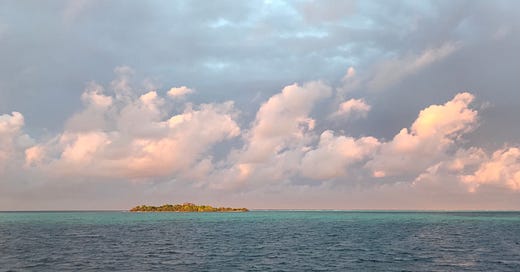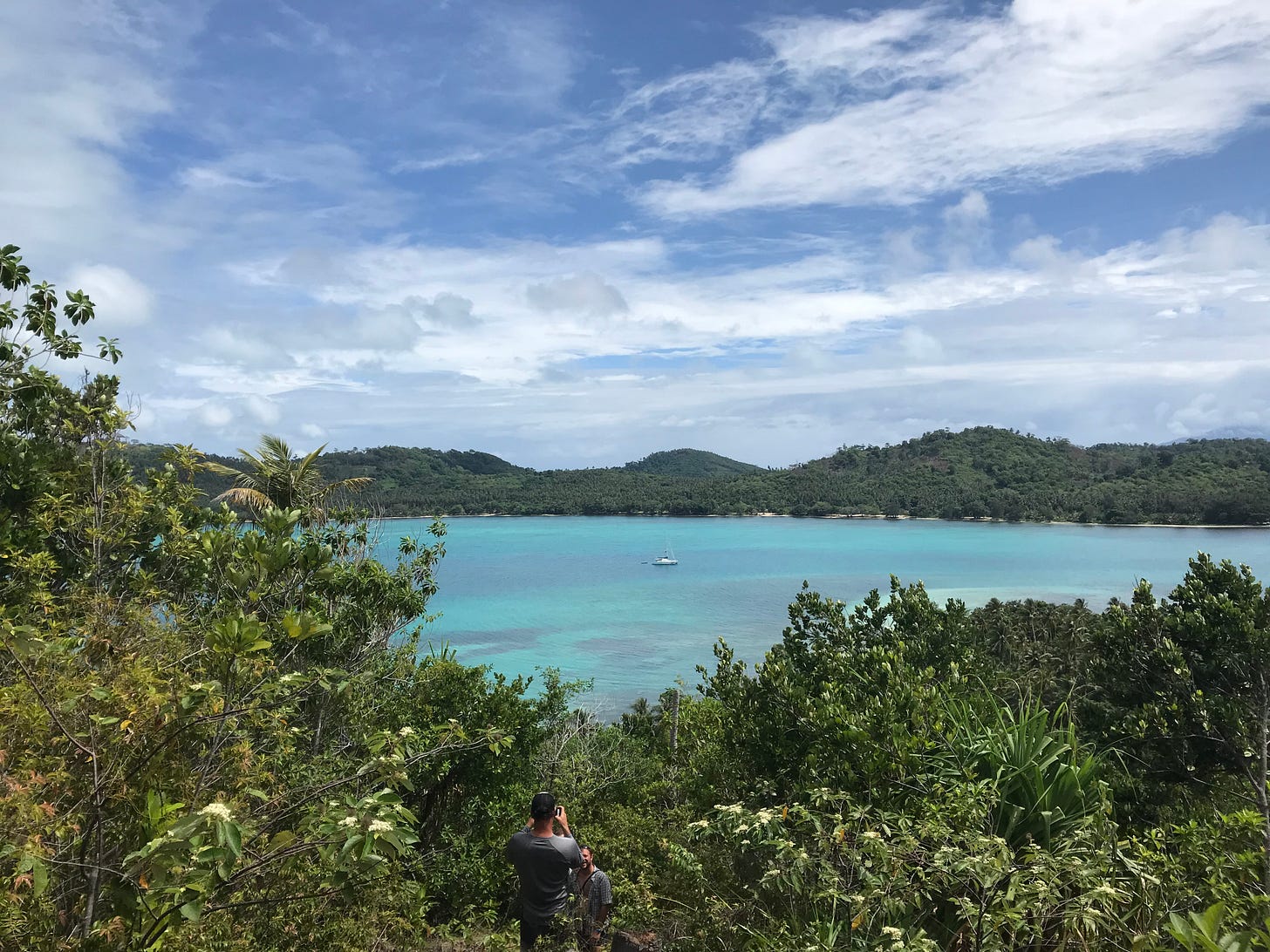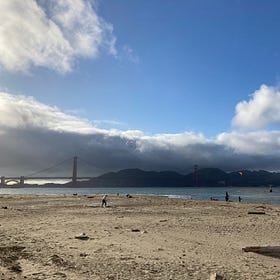Flying into Hong Kong in the fall of 2017, I was pinned to the window, hoping to somehow catch a glimpse of the dystopian scene that I remembered when I’d first been there with my dad back in ’83—our 747 swooping low on approach to Kai Tak, diving between rain-spattered skyscrapers flashing huge neon billboards, the low sky crowded with dark, heavy clouds. More than thirty years later though, the old airport was gone, the city had changed, and I was no longer a teenage boy along on a business trip with my father. My fantasy image dissolved on the long taxi ride in from the new airport, and by the time I arrived at my hotel, I was lonely, jet-lagged, and crestfallen, reminded that I was off on what amounted to yet another expensive diversion—and from what I still didn’t quite exactly know.
I spent two days in HK nursing my back, drinking and wandering the humid, grey streets. Eighties Hong Kong had been a city of the future, ahead of much of the rest of the world, teeming with life, the sidewalks packed shoulder-to-shoulder like the camera gear that covered every inch of the walls of the camera shops in Tsim Sha Tsui, but the city of the present seemed like so many others run together by modernity, globalization and aesthetic trends made instantaneously universal by Instagram. I touched the past for moments, hiking the long steps to the misty peak, on the ferry across Victoria Harbor, and in the blocks of Wan Chai where washing still hung from windows above neighborhood markets with baskets of dried fish, but it felt like I was just marking time. I should have taken my stop there for what it was: a chance to visit a place that I’d been once long ago, without any expectation of going back to that time, or of having anything hugely striking somehow revealed.
After two days I flew to Port Moresby, the capital of Papua New Guinea, and then east to a tiny airstrip on the island of Misima to meet the sailing yacht Discovery for the last of a series of deluxe sailing and kitesurfing trips that I’d bought into a few years prior. By the time I stepped board, it had become clear to me that I needed and wanted something much more real and direct in terms of adventure, but I’d paid for the trip long in advance, and it seemed like a shame not to go. I was playing out the tail end of my time as a business owner, having told myself that I had the money and somehow deserved the extravagance in exchange for having worked away at something that I didn’t quite love.
The fact is, I felt like a rich tourist, and not a very bright one—a bit of an asshole really—for having spent so much for a vacation that I didn’t need, and without much chance of coming home with any sort of real story to tell, since the whole thing was planned and run by someone else.
Even so, after the three days of travel it has taken to reach the Louisiade Archipelago, I was about as far as I could possibly get from home, and despite the thick spread of luxury I was as thrilled as always by the radical dislocation and charmed by the raw, remote environment. I’d been on that boat before in Chile, Polynesia, Micronesia and the Marshall Islands, but the atmosphere here was different—perhaps also because of the mass of placid, superheated air that had settled over the islands around the time of my arrival.
As we set off, it seemed to me that the weather was conspiring to punish me for having no serious reason for being there. The sky was a heavy reach of deep blue with only the faintest breath of wind, and the sea, also calm, appeared lavender-turquoise, with low green smudges in the distance. The scene was unbelievably idyllic—and also dangerously lifeless. We drifted slowly from island to island, bartering bags of rice for fresh fruit with the locals and surfing tiny waves kicked up in the coral passes by the feeble tides. It would have been idiotic to imagine any complaint about our situation, but we were there to sail, and the wind was not cooperating.
The immense calm persisted, and by the ninth day, all of us on board were restless and drowsy as we floated in the sun-baked, limpid bowl of a vast atoll. Swimming was the only relief from the overheated, soupy air, and I didn’t hesitate to throw myself over the side whenever I felt my body temperature rising.
I felt an itch the next morning when I woke, and found a small blister rising on my right index finger. Upstairs in the cockpit, I had an early breakfast with the other guests, three Australian dudes in their thirties and an American 4chan type who’d gone bush in Sumatra. Still just after dawn, the heat caused a sort of sea-fog to rise directly from the surface of the water, obscuring everything beyond the rails, and leaving us suspended in a yellow-pink bubble glowing with gauzy sunlight.
As the sun rose higher into the morning sky, the vaporous haze was pierced by the bright calls of seabirds, and then opened enough to reveal the low, verdant tangle of a nearby sandbar covered in mangrove. Purple, blue and yellow fish rose and fed on tiny floating insects. The horizon remained invisible.
After breakfast, a lifetime of anxious habits with my hands drove me below to pierce and drain the blister, even though I knew it was better left alone. At lunch, the ship’s mate said I must have touched a free-floating stinging cell from a jellyfish, and that it would get infected if I couldn’t keep it dry.
I hadn’t noticed anything when it happened. I was tuned out, hypnotized by the stillness and heat—and it was impossible to keep anything dry. Even the air was wet—and what’s more, I was used to relying on my constitution. I put the mate’s warning aside, dove in again, and then slept through the silence of the motionless afternoon.
By the next morning, the pinhole in my finger had expanded into a round, angry wound the size of a pencil eraser, and dots of pink pus stained my sweat-soaked sheets. The mate produced a few capsules of expired Cipro, which I washed down with coffee, then beer in the afternoon. I wasn’t entirely unconcerned by the potential danger of an open sore in the tropics, but the end of the trip was approaching, and I expected that I’d be able to find a proper clinic as soon as I was back on dry land.
Later that evening, the hole in my finger had grown further, with a blobby black-and-white mass forming in the center. My finger pulsed gently as we played rounds of Spades and drank the last of my favorite tequila—Fortaleza reposado—that I’d brought along to stock the ship’s bar.
Two days later, we returned to the tiny, rusty port town from which we would fly back to civilization. My forearm felt tender as I climbed into the dinghy, and I noticed a cluster of evil-looking red streaks climbing past my elbow—a clear sign of septic infection. I drew a sharp breath as the ancient spectre of amputation sifted from the tangle of dark tropical forest crowding the shore. Mostly a threat of the past, but still, those arrows were headed for my heart.
As expected though, I was able to find a clinic shortly after returning to the capital. Removing my bandage for the nurse, I showed her what had now deepened into a shallow, bloody pit, edged in black, necrotic flesh. She wrinkled her nose and handed me fresh packet of Amoxicillin, assuring me that I’d be fine as long as I got it looked at as soon as I was Stateside.
My route home involved an all-day stopover in Manila before my flight onwards to San Francisco. Manila is mostly huge sprawl of grit and smog, but I’d been through there a couple of times, and I was proud of myself for knowing the city well enough to find some charm amidst the chaos instead of waiting it out in the terminal.
After a refreshing vegetarian lunch, I hopped from one patch of shade to another as the early-afternoon sun radiated down into the damp streets of Makati, making my way towards the The Blind Pig. Once I slipped inside, the quiet, shadowy interior was an immediate relief, set off by the crisp uniforms of the bar staff and the carefully arranged bottles and glassware glittering under low-voltage lamps.
The bartender nodded a welcome as I sat myself at one of the vacant tables, alone, and picked up the menu. Stepping over to where I was seated, the waiter couldn’t help but notice the crude bandage on my hand, and cast his gaze downwards with genuine concern.
“Sir, are you injured?” he asked.
Hidden beneath the winding of tape and gauze there was a raw, seeping cavity a centimeter in diameter. I could feel fluid from the infection wanting to drip down the back of my hand.
I lowered my eyes as he continued with solicitous caution. “If you’re taking antibiotics, it would be best not to drink alcohol.”
It was no surprise that he’d guessed—my finger was throbbing, and visibly inflamed—and it wasn’t just that I wanted a drink more than I cared about risking part of my finger. After two weeks away on a trip that I shouldn’t really have taken in the first place, I was languishing, dissipated and desperate yet again for something that felt real and familiar—and as a lifelong drinker, alcohol fit the bill. I was also doing my best to return home with at least something to report from an otherwise uneventful five-star sailing cruise, and, pathetic as it was, the little story about having found a bar in Manila with the exact same name as the place that Julie and I had moved to live next door to, back in Ann Arbor, seemed like some sort of meaningful triumph.
The well-groomed young server stood there politely with his hands clasped as my unconscious fought the same quiet war it had been for years, yet again remaining unacknowledged. I fingered a matchbook on the table in front of me and then looked back up at the waiter, a liar’s weak smile belying what I was about to say. “It’s just a cut,” I assured him. “Make me a tequila old fashioned—and use something good, wouldya?”
Thanks for reading, and for being part of this journey.
This is part of AN ORDINARY DISASTER, one man's proof that despite what may seem like our inability to hear it, and all of our attempts to avoid it, we can all learn to listen to ourselves, and to act upon the inner voice of our self, our sanity and our soul.
Further reading
Here’s the table on contents for my memoir in progress. You might also enjoy some of my other writing on subjects mentioned here, such as:
Why I No Longer Cringe at Being Called a "Kitesurfer"
I have a younger friend who used to introduce me at parties as a “kitesurfer.” We’d be standing there with some strangers, cans of hazy IPA or sparkling water in hand, and then there’d be that pause. I could feel it coming—and although I knew he was just doing his best to talk me up as a grey-haired cool cat—I always cringed when I heard the word come o…
Sex is Better Sober ...and 23 other reasons why Alcohol is Obsolete
I like to use the word obsolete to refer to something that’s perhaps not quite already entirely of the past but that’s on its way out, that should be gone soon, and that I am choosing to remove from my consciousness. By declaring something obsolete I’m no longer referring to it as present in my life.
or any of the other essays that you can find here:
Eighteen essays about addiction, masculinity, creativity, and intuition
I recently divided my stack into sections—memoir, essays, mediations, and perhaps soon more—and in doing so I was reminded that I’ve put out no fewer than eighteen long form essays so far here, on topics ranging across anxiety, fitness, creativity, sobriety, self-discipline, purpose, love, adventure, sciatica, pain, AI, intuition, the collective unconsc…
I’ve got some questions for you
Have you ever injured yourself through sheer negligence? Do you bear any scars from self-indulgence and sloth?
What’s your own relationship with alcohol and how has that changed over time?
How do you know what’s right for you—and how has that changed?
Please share, comment, restack, recommend, and click the little ♡ heart right there 👇🏻 if you dig this piece. I’d love to hear from you!








Here's one for ya Bowen. When I was 18 I’d become pretty competent at parkour. Back then the sport still seemed like some esoteric take on gymnastics mastered by a few French and British nutters. What it meant for me was a bag of impressive party tricks, which meant better chances with women! One evening on the way to a party hosted by a girl I really fancied, I attempted my signature ‘wall flip’ for my friends. Since I’d consumed a hefty amount of vodka, I didn’t complete the rotation and instead smashed my left knee on the pavement. I woke up in hospital with a headache, an obliterated kneecap, and a missed opportunity with a girl who apparently liked me too! My relationship with vodka today is, as you’d expect, non-existent.
Thanks for your piece and hey, at least you came back from the trip with a story to tell in the end. Even if it involved the threat of sepsis… still scary stuff even today.